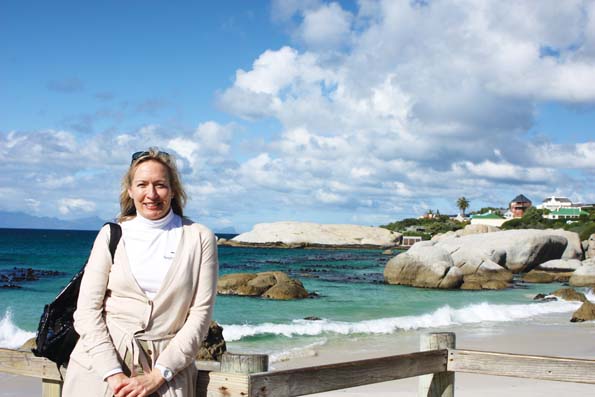Your Wrist is Becoming Prime Real Estate
From Fitbits to smart watches to Disney’s MagicBands, companies are lining up to know more about you all in the name of customer and guest experience. Let’s add Lightwave to that list.
Lightwave is new wearable that debuted at the 2014 South by Southwest conference in Austin. Attendees at a Pepsi-sponsored event linked the wristbands to personal information, such as age and hometown (the wristbands can be linked anonymously, too). The wristbands measured audience movement, temperature, and sound levels, and the DJ and audiovisual team adjusted the environment and song selection based on the information received. Lightwave uses low-energy Bluetooth for events with fewer than 500 people, or it uses a radio-signal for larger crowds. Real time analytics are available to organizers.
“At a trade show it might be used to tell you how people are feeling during a keynote or what talking points are resonating [by measuring applause levels], or what booths people are spending time at,” Rana June, Lightwave founder and CEO, told BizBash. “And that can be broken down by gender. Or it could be very helpful to know this bar has a wait, but the one over there doesn’t, and we can redirect people.”
Want to watch a short, rave-inspired promo video about this new bio-reactive device? Good, because we have it for you below.
IAVM Member Karen Kotowski Named as a Power Player
Smart Meetings just published a list of power players in the meeting and event industry, and one of our IAVM members—Karen Kotowski, CEO of the Convention Industry Council—made the list.
Here’s what the magazine wrote about Kotowski:
Check out the article for more of Kotowski’s story and to read about the other power players. Congratulations, Karen!
(Image: Smart Meetings)
Expand Your Horizons At VenueConnect 2014
Once a year, the entire association gathers to learn and network across all sectors at IAVM’s VenueConnect Annual Conference and Trade Show. For many attendees, this industry-wide, global gathering delivers some of the greatest opportunities for inspiration, innovation, and education—creating beneficial connections with venue professionals you normally would not know through the smaller sector conference setting.
We encourage our members to take advantage of this opportunity and with conference registration open, we’ve asked this year’s VenueConnect Planning Committee Chair and the association’s 2nd Vice Chair, Karen Totaro, CFE, about the benefits of attending, and what she is looking forward to about this year’s conference taking place July 26-29 in Portland, Oregon. Continue Reading →
You Can Now Blame Your Genes for Forgetfulness
For those of us who have trouble remembering names, we can now blame our genes. Forgot where the TV remote is? Blame your genes. Missed the exit. Blame your genes.
Scientists at the University of Bonn in Germany have discovered a connection between forgetfulness and the DRD2 gene. People who have a certain variant of this gene are more easily distracted and experience higher rates of incidences due to a lack of attention.
“A familial clustering of such lapses suggests that they are subject to genetic effects,” said Dr. Sebastian Markett, the principal author of the study.
The researchers previously found that the dopamine D2 receptor gene (DRD2) plays a role in forgetfulness. The gene also has an essential function in signal transmission in the brain’s frontal lobes.
“This structure can be compared to a director coordinating the brain like an orchestra,” Markett said.
In other words, the DRD2 gene is the baton, and if the baton gets off beat then the orchestra (the brain) gets confused.
All humans carry the DRD2 gene, which has two variants defined by only one letter within the genetic code. One variant is C (cytosine), and the other is T (thymine). The scientists found that those people who carried the thymine variant experienced more lapses in attention and memory than those who carried the cytosine variant.
“The connection is obvious; such lapses can partially be attributed to this gene variant,” Markett said. “This result matches the results of other studies very well.”
Markett said that people shouldn’t be resigned to fate just because they can’t control their genes.
“There are things you can do to compensate for forgetfulness; writing yourself notes or making more of an effort to put your keys down in a specific location–and not just anywhere,” he said.
Perhaps, you should drink more green tea, too.
Are you prone to forgetfulness? What things do you do to help mitigate it? Please share your tips in the comments section.
(photo credit: Wade Morgen via photopin cc)
Ohio State Students Win Venue Renovation Challenge
The first annual American Society of Theatre Consultants (ASTC)/United States Institute for Theatre Technology (USITT) Venue Renovation Challenge award was presented in Fort Worth, Texas, at the 54th annual USITT Conference and Expo in March. Andy Baker, Evan Bunner, Shane Cinal, and Josh Quinlan from Ohio State University, with Paul Sanow from ASTC, won the award.
Three teams of student USITT members participated in a challenge designed to engage students in real-world theater renovation problems under the guidance of practicing professional theater consultants. Each team selected an existing venue and developed a scope of work for practical improvements to a building as a performance venue. Students presented their design concepts to a live audience at a USITT panel.
The other two teams included Amanda Warren and Jason Monmaney from Stephen F. Austin State University with Jules Lauve (ASTC) and Sandy Everett, Meghan Potter, Jeff Lindquist, Brad Shaw and John Houtler-McCoy from Indiana University with Van Phillips (ASTC).
“The Challenge was a great opportunity for me as a professional to work with students who will soon start their careers,” Sanow said. “They learned a lot about our role as theater consultants, the process of how theater performance facilities are designed, and it caused them to consider that even if an environment is found in one condition it can still be transformed into something else that is better or more appropriate to a new mission. I wish an opportunity like this was available when I was a student.”
The Challenge will be held again next year at the USITT Conference and Expo in Cincinnati, Ohio.
(Image: From Ohio State University’s presentation)
Do you want to receive a Front Row News weekly digest?
Categories
- Allied (861)
- Architecture (147)
- Arenas (747)
- Career (897)
- Convention Centers (895)
- Education (623)
- Events (1,544)
- Food & Beverage (193)
- Foundation (113)
- Guest Experience (1,496)
- Industry News (2,270)
- Leadership (1,888)
- Marketing (150)
- Membership (2,000)
- Music (213)
- Performing Arts Centers (454)
- Professional Development (409)
- Research (127)
- Safety & Security (442)
- Sports (763)
- Stadiums (608)
- Student (159)
- Technology (516)
- Ticketing (92)
- Touring (82)
- Trends (364)
- Uncategorized (742)
- Universities (218)
- Video (25)
- Young Professional (198)
Twitter Feed
- Twitter feed loading
Recent Posts
- Seattle Convention Center Announces Strategic Leadership Appointment and Growth Initiatives for 2026
- Peggy Daidakis Humbly Made Convention Center History
- Welcome to Our Newest Members
- New Member Benefit! IAVM Partners with Advantage Training to Elevate Staff Readiness and Guest Experience
- Charlotte Convention Center Welcomes Two New Leaders to its Management Team
Categories
- Allied
- Architecture
- Arenas
- Career
- Convention Centers
- Education
- Events
- Food & Beverage
- Foundation
- Guest Experience
- Industry News
- Leadership
- Marketing
- Membership
- Music
- Performing Arts Centers
- Professional Development
- Research
- Safety & Security
- Sports
- Stadiums
- Student
- Technology
- Ticketing
- Touring
- Trends
- Uncategorized
- Universities
- Video
- Young Professional
Archives
- December 2025
- November 2025
- October 2025
- September 2025
- August 2025
- July 2025
- June 2025
- May 2025
- April 2025
- March 2025
- February 2025
- January 2025
- December 2024
- November 2024
- October 2024
- September 2024
- August 2024
- July 2024
- June 2024
- May 2024
- April 2024
- March 2024
- February 2024
- January 2024
- December 2023
- November 2023
- October 2023
- September 2023
- August 2023
- July 2023
- June 2023
- May 2023
- April 2023
- March 2023
- February 2023
- January 2023
- December 2022
- November 2022
- October 2022
- September 2022
- August 2022
- July 2022
- June 2022
- May 2022
- April 2022
- March 2022
- February 2022
- January 2022
- December 2021
- November 2021
- October 2021
- September 2021
- August 2021
- July 2021
- June 2021
- May 2021
- April 2021
- March 2021
- February 2021
- January 2021
- December 2020
- November 2020
- October 2020
- September 2020
- August 2020
- July 2020
- June 2020
- May 2020
- April 2020
- March 2020
- February 2020
- January 2020
- December 2019
- November 2019
- October 2019
- September 2019
- August 2019
- July 2019
- June 2019
- May 2019
- April 2019
- March 2019
- February 2019
- January 2019
- December 2018
- November 2018
- October 2018
- September 2018
- August 2018
- July 2018
- June 2018
- May 2018
- April 2018
- March 2018
- February 2018
- January 2018
- December 2017
- November 2017
- October 2017
- September 2017
- August 2017
- July 2017
- June 2017
- May 2017
- April 2017
- March 2017
- February 2017
- January 2017
- December 2016
- November 2016
- October 2016
- September 2016
- August 2016
- July 2016
- June 2016
- May 2016
- April 2016
- March 2016
- February 2016
- January 2016
- December 2015
- November 2015
- October 2015
- September 2015
- August 2015
- July 2015
- June 2015
- May 2015
- April 2015
- March 2015
- February 2015
- January 2015
- December 2014
- November 2014
- October 2014
- September 2014
- August 2014
- July 2014
- June 2014
- May 2014
- April 2014
- March 2014
- February 2014
- January 2014
- December 2013
- November 2013
- October 2013
- September 2013
- August 2013
- July 2013
- June 2013
- May 2013
- April 2013
- March 2013
- February 2013
- January 2013
- May 2012
- March 2012
- December 2011
- November 2011
- October 2011
Recent Comments
- Frank Bradshaw, Ph.D., CVE on John Meyer, CVE, a Tireless Advocate of Certification for Venue Professionals, Has Died
- Neil Sulkes on Hilary Hartung, Friend to Many in Venue Marketing, Has Left Us
- Jason Parker, CVE on The Devastation of Hurricane Helene and How We Can Support One Another
- Larry Perkins on Touhey Testifies Against Speculative Ticketing Before Congressional Subcommittee
- Peter Secord on Major Players for Planned Elkhart Amphitheater Were in the Mix at VenueConnect





